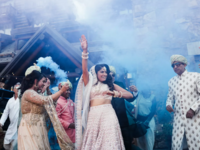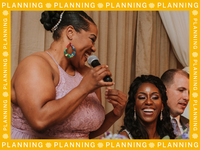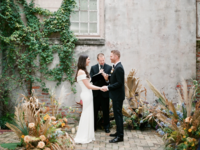Unique Wedding Traditions Around the World From 50 Cultures & Religions
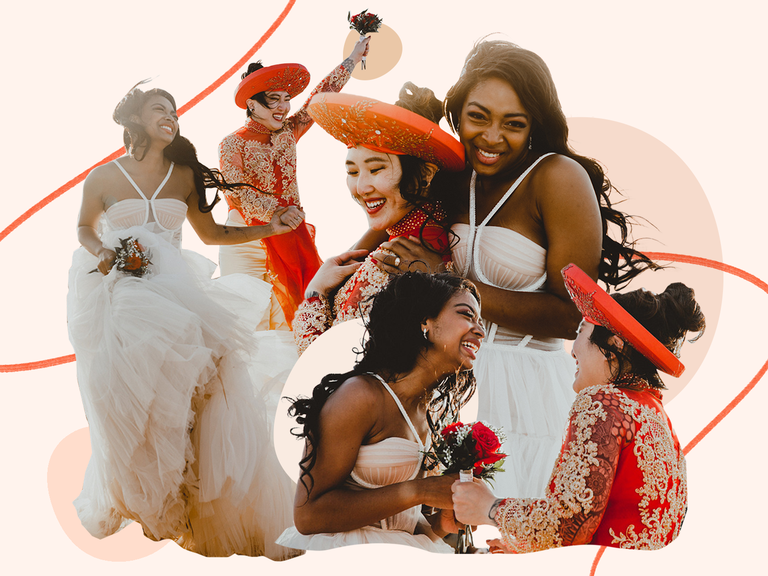
We love seeing the beautiful diversity among the many wedding traditions around the world. While weddings represent the start of something new, they're also a chance to honor and acknowledge a couple's upbringing and family. As such, rituals are often a part of most wedding ceremonies and receptions, no matter what religion or culture the couple identifies with. "A wedding is about two families merging and celebrating the various cultures, traditions and heritage they've grown up with," says Jaclyn Watson, a wedding expert with over 14 years of experience and the principal planner of Jaclyn Watson Events.
Whether you're attending a friend's wedding and want to know what to expect, are getting married and looking for ways to showcase your heritage or are simply curious about other cultures and religions, we've rounded up more than 50 wedding customs from around the world for you to explore. So, sit back, relax and feel as though you're traveling the globe as we take you through some of the traditions couples include in their weddings.
Cultural and religious wedding traditions from around the world: Arab | Armenian | Black and African-American | Cambodian | Catholic | Chinese | Colombian | Congolese | Cuban | Dutch | Eastern European | Eastern Orthodox | Ethiopian | Egyptian | Filipino | French | German | Ghanaian | Greek | Hawaiian | Hindu | Indian | Irish | Italian | Jamaican | Japanese | Jewish | Korean | Latin American | Lebanese | Libyan | Mexican | Moroccan | Muslim | Native American | Nigerian | Norse | Pakistani | Persian | Polish | Protestant | Puerto Rican | Romanian | Russian | Scottish | Spanish | Swedish | Thai | Turkish | Vietnamese | Other Traditions to Know
Plus: Top Cultural Wedding Tips
1. Arab Wedding Traditions
Are you wondering what to expect at a traditional Arab wedding? Most weddings across the Arab world, including North Africa and the Middle East, are Muslim and follow Islamic practices and traditions. The zaffe is one of the most festive Arab culture wedding traditions—it's a lively processional that involves dancing and drumming.
2. Armenian Wedding Traditions
Weddings in Armenia are grand affairs focused on family. From the onset, the family is often involved with the proposal known as Khosk-Arnel which generally takes place at the bride's family's home. During this, the groom's family will arrive at the bride's home with treats and everyone sips tea together to celebrate the couple's engagement. Throughout the rest of the wedding, the family remains central to the celebration.
3. Black and African American Wedding Traditions
Black and African-American weddings are steeped in rich traditions and often represent a mix of customs with African roots and those that honor the history of perseverance many couples' forebears fought for. Two especially notable traditions are the jumping the broom and libation ceremony. The jumping the broom ritual, which takes place at the end of the wedding ceremony, involves the couple jumping over a broom that's on the ground in front of them to seal their marriage. A libation ceremony, which has West African roots, is a ritualistic pouring of a liquid to honor one's ancestors. While the ritual is a chance to esteem ancestors, there's also space for couples to customize the ceremony by selecting whatever beverage they want for the occasion.
4. Cambodian Wedding Traditions
Cambodian and Khmer weddings are rich with cultural influences. Most weddings in Cambodia are Buddhist and last three days. One unique and notable Cambodian wedding tradition is known as Gaat Sah. It's a ceremony in which a few strands of hair are cut from the to-be-weds' heads which symbolizes saying goodbye to their old life and embracing their new marriage.
5. Catholic Wedding Traditions
Weddings in the Catholic church are very structured, liturgical events. Holy Communion and the recitation of The Lord's Prayer are two important elements of a traditional wedding mass within the Catholic church.
6. Chinese Wedding Traditions
Many of the cultural wedding traditions practiced at Chinese weddings deal with bringing good luck to the wedding and paying honor and respect to the elders who've come before the couple. The color red and the double-happiness symbol are both considered auspicious and are generally threaded throughout much of a Chinese wedding as a way of bringing good luck to the celebration.
A traditional Chinese tea ceremony typically takes place during a wedding. As part of this ritual, the couple will serve tea to their parents as a sign of honor and respect. It's a time-honored tradition and a meaningful way for couples to thank their parents for all they've done for them. In return, parents usually give the couple red envelopes with money as a wedding present and a reciprocal show of appreciation.
7. Colombian Wedding Traditions
Get ready to dance at a traditional Colombian wedding. La Hora Loca, or "the crazy hour," is a festive time of revelry that typically takes as part of the Colombian marriage culture. Another Colombian wedding tradition of note? Mantilla veils are a typical element of Colombian wedding dress.
8. Congolese Wedding Traditions
When Tanya Marie Zielke, content creator and member of The Knot Most Influential Weddings crew, married she infused her nuptials with Congolese wedding traditions as an homage to her heritage. "As a biracial Congolese-American and my husband being Mexican-American, we [had the chance to] incorporate [both cultural] elements into the wedding to honor our roots," Zielke tells us. Since she is the great-granddaughter of Mwant Yav Ditend, a past Emperor of the Lunda Tribe in the Democratic Republic of Congo, she was able to experience the opportunity of a lifetime. "My family gave me a traditional royal blessing during the reception. They walked with [my husband and I] while singing a traditional Lunda song, then showered us with blessings and performed the money dance. All of our wedding guests joined in––it was beautiful."
In addition to including a traditional blessing and money dance, Zielke used fashion to pay tribute to her cultural heritage and the many other cultures present at the nuptials. "I asked guests with a cultural background to wear their traditional attire. It was beautiful to see that represented. We had guests from all over the United States, Europe and Africa."
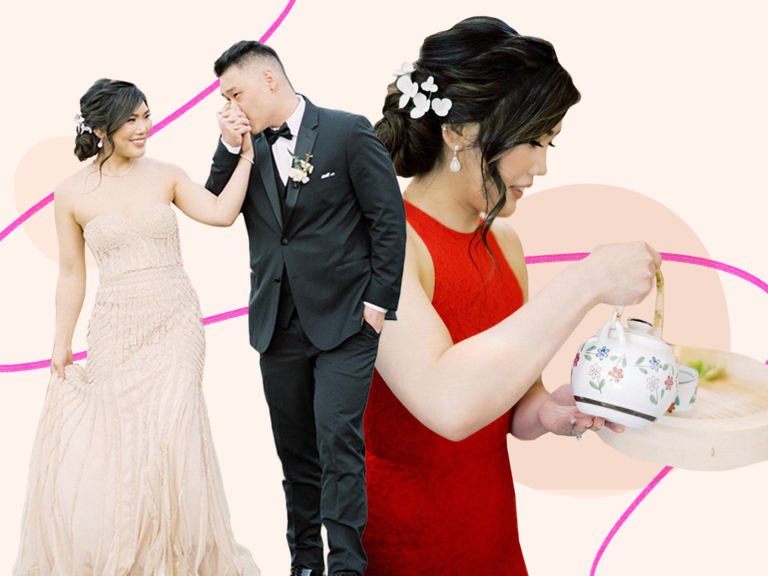
9. Cuban Wedding Traditions
Cuban weddings are filled with beauty but are typically secular in nature. Following changes brought about during the Castro regime, many traditional Cuban weddings integrate few religious elements. As for the menu at Cuban weddings, you can always expect it to be mouthwatering, with rum drinks and dulce de leche desserts typically on deck.
10. Dutch Wedding Traditions
Many traditions seen at weddings in the Netherlands involve food. To start, weddings in Holland have a historic tradition known as bruid suikas, a sweetmeat, often consumed at the bride's home before the big day. At the wedding, a bowl filled with brandy and raisins is generally passed around between guests while singing.
11. Eastern European Wedding Traditions
Many Eastern European countries, such as Romania, the Czech Republic, Slovakia and Poland are predominantly Orthodox and generally incorporate traditions inspired by the Orthodox church. And while weddings are typically joyous occasions, many Eastern European cultural weddings focus on the somber, serious side of aging and entering adulthood that goes along with these celebrations.
12. Eastern Orthodox Wedding Traditions
The crowning is one of the most central parts of a traditional Eastern Orthodox wedding ceremony. During this ritual, the priest will place crowns, connected by a white ribbon, upon the couple's heads to symbolize their unity.
13. Ethiopian Wedding Traditions
Traditional weddings in Ethiopia are incredibly diverse, but there are still many mainstay rituals and customs that are often associated with Ethiopian wedding culture. Notably, a tradition known as the shimagelay may take place on the morning of the wedding as a blessing of the betrothal.
14. Egyptian Wedding Traditions
Egyptian wedding traditions are rich in culture and history. This is no surprise given the long history that has built and influenced the modern-day country with the 14th largest world population. From a special wedding ring tradition to tasty reception food, the cultural wedding traditions at Egyptian nuptials are memorable.
15. Filipino Wedding Traditions
Weddings in the Philippines and between Filipino couples often include two notable traditions: the cord and veil ritual and the exchange of 13 coins, known as arras. The cord and veil custom represents the couple's oneness in marriage while the coins symbolize their commitment to provide for each other throughout their married life.
16. French Wedding Traditions
At traditional weddings in France, it's fairly uncommon to see bridesmaids and groomsmen as part of the event. While a couple may have close friends present to support them on the big day, there generally isn't a designated wedding or bridal party. Additionally, decadent French food, from macarons to croquembouche, is a big part of the country's festive wedding celebrations.
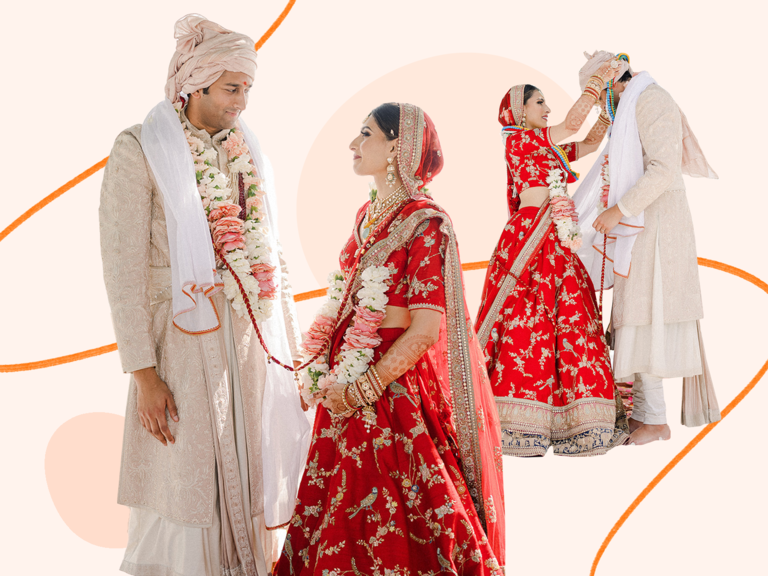
17. German Wedding Traditions
Traditional weddings in Germany are known for a variety of distinct rituals. Firstly, polterabend takes place the night before the wedding where people will break porcelain as a raucous, yet celebratory, way of ushering in the big day. The couple will clean up the broken pieces to show they can work together to accomplish a shared goal. Baumstamm sägen is another distinctively German wedding tradition where the couple will saw through a log at the wedding to showcase their teamwork.
18. Ghanaian Wedding Traditions
Ghanaian wedding traditions begin with a meaningful prewedding engagement ceremony and don't wrap up when the reception concludes—there's also often a postwedding ceremony that's observed. For the main event, Ghanaian cultural wedding traditions include lots of gift-giving and an upbeat money dance during the wedding reception.
19. Greek Wedding Traditions
Traditional Greek weddings often follow the rituals set forth by the Greek Orthodox church. As such, Greek wedding ceremonies will customarily include the crowning and the couple will sip wine from the common cup.
20. Hawaiian Wedding Traditions
Traditional Hawaiian weddings often begin with the blowing of the pū, a conch shell horn, to start the wedding. From there a chant known as "Oli Aloha" will further usher in the wedding ceremony. During a Hawaiian wedding, the couple will often exchange leis and participate in pili ā nai kealoha, a ritual where the couple's hands are tied together by the officiant.
21. Hindu Wedding Traditions
Traditional Hindu weddings are extremely ceremonial and ritualistic and the beautiful customs aren't limited to the wedding day alone, but begin prior to the ceremony with practices such as the mehndi, sangeet, haldi and baraat ceremonies. A mehndi party is a prewedding event at Indian weddings where the bride and bridal party will get henna applied to their skin in intricate designs. While some modern couples don't practice all the historic Hindu wedding rituals, henna application is still widely practiced at Hindu weddings.
Another noteworthy Hindu aspect is mandaps, a structure where a Hindu wedding ceremony takes place underneath. While the rituals under the mandap carry meaning, even the structure itself is extremely significant as it represents the couple's home.
22. Indian Wedding Traditions
While the majority of weddings in India are Hindu, not all Indian couples exchange Hindu nuptials—Jain, Sikh and Muslim weddings are also common in India. Many traditional non-Hindu Indian weddings will still feature things like mandaps and the inclusion of turmeric, however, the meaning and the names of the specific rituals differ from their Hindu counterparts.


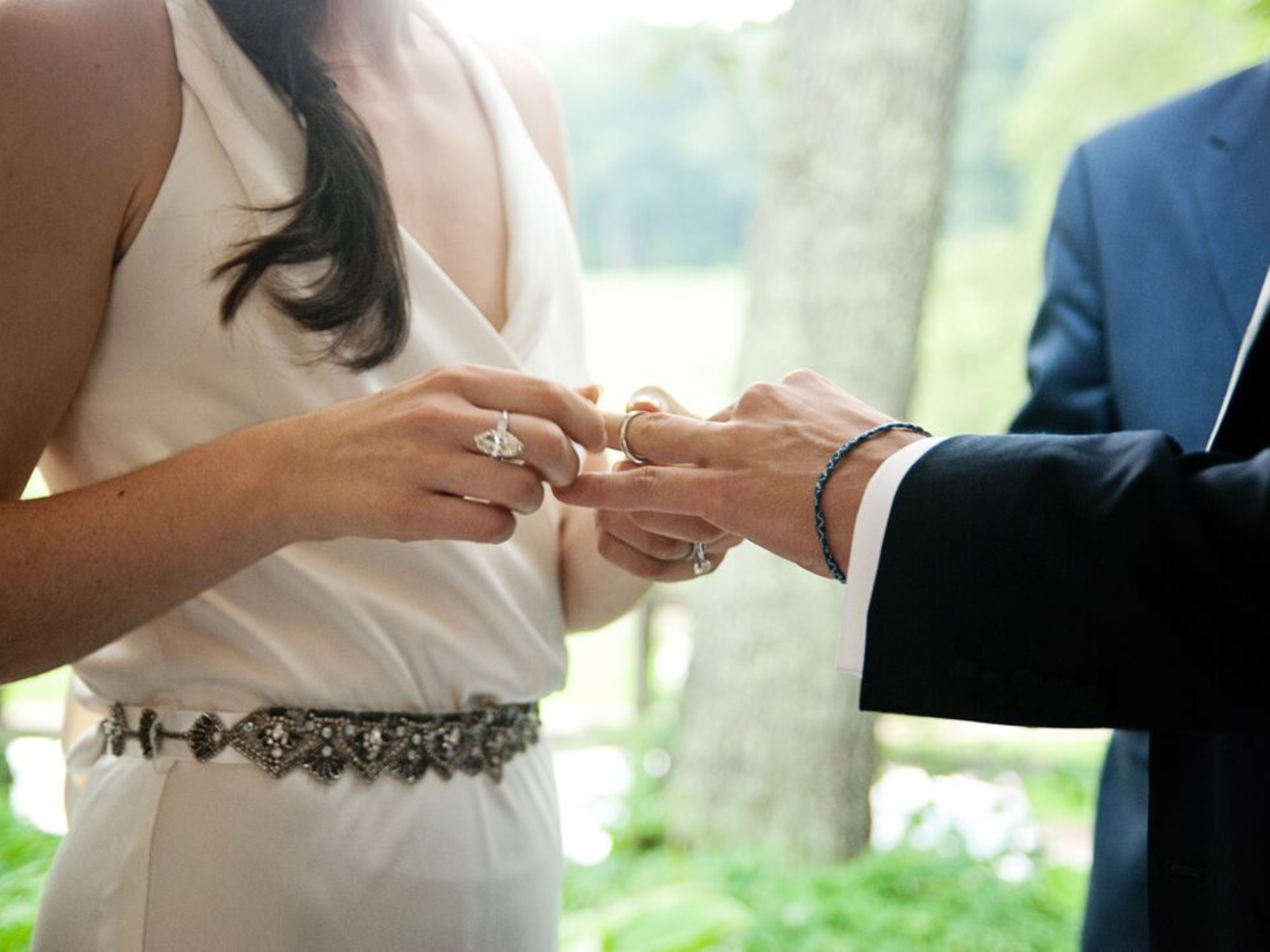
23. Irish Wedding Traditions
Traditional Irish weddings are filled with many rituals and superstitions. From the inclusion of "something blue" to Irish lace, each element of an Irish wedding is chosen with meaning and care. Weddings in other Celtic cultures, like Scottish and Welsh weddings, may also often include traditions similar to those seen at Irish weddings.
Handfasting is a notable ritual that is part of traditional Irish wedding culture. While handfasting is most common at Irish and Celtic wedding ceremonies, many modern non-Irish couples bring the custom into their weddings. The custom involves tying the couple's hands together during the ceremony to represent their unity and bond in marriage.
24. Italian Wedding Traditions
Cue the confetti—traditional Italian weddings are all about celebrating la dolce vita (the sweet life). Good food, like a millefoglie wedding cake, and lots of dancing are key elements of Italian weddings.
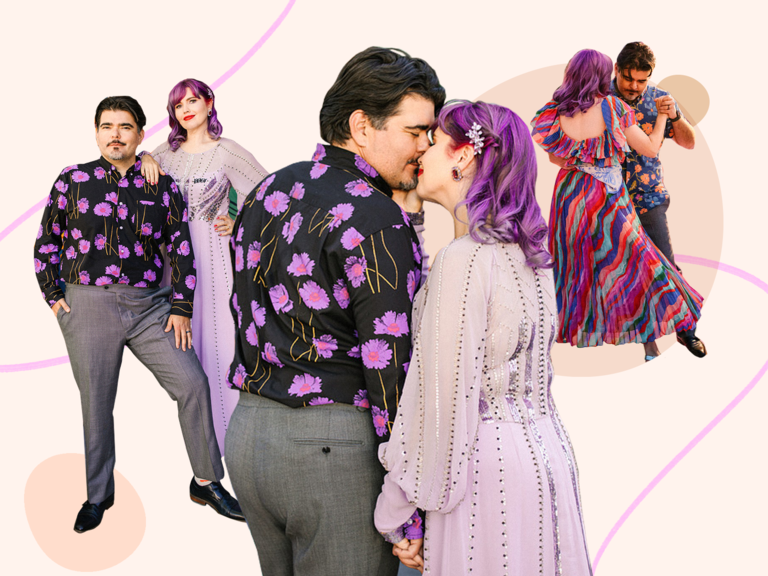
25. Jamaican Wedding Traditions
Much like Italian weddings, traditional Jamaican weddings are filled with good food and lots of dancing. Notably, black rum cake is often served at Jamaican couples' weddings.
26. Japanese Wedding Traditions
Traditional Japanese weddings are highly reverent affairs with lots of structure and ceremony. Couples will often select their wedding date based on what day will be the most auspicious and host a daytime wedding without dancing.
27. Jewish Wedding Traditions
While breaking the glass is one of the most recognizable Jewish wedding traditions, it's just one of many rituals included in a Jewish wedding. Additionally, chuppahs are the altar structures where Jewish weddings take place. The structure represents the couple's home, has four corners and requires that the opening on top is covered.
28. Korean Wedding Traditions
While traditional Korean weddings are filled with meaningful customs, they're also fun and festive. Notably, the tradition of pyebaek is an entertaining element that involves the bride catching chestnuts in the skirt of her hanbok as the groom throws them at her.
29. Latin American Wedding Traditions
While traditional weddings across Latin America have their own nuances and things that make them unique, many of the rituals celebrated in Latin America have similarities. One interesting ritual is the lasso ceremony. It involves a rope being draped around the shoulders of the couple during their wedding ceremony to mark them coming together as one. The lasso ceremony is similar to the Filipino practice of the cord and veil ritual.
30. Lebanese Wedding Traditions
Like other wedding customs around the world, traditional Lebanese weddings have an abundance of significant practices. There's often a prewedding henna party and a zaffe wedding processional on the big day. And it's best to come hungry to a Lebanese reception because there'll be plenty of delicious food.
31. Libyan Wedding Traditions
Since Libya's state religion is Islam, traditional Libyan weddings are often Muslim and overseen by an Imam. The wedding ceremony is very private and usually is at the bride's home on a separate day from the jovial celebrations.
32. Mexican Wedding Traditions
Like many Latin American weddings, traditional Mexican weddings often include the lasso ceremony and are generally Catholic. Additionally, a mariachi band may be present for musical entertainment.
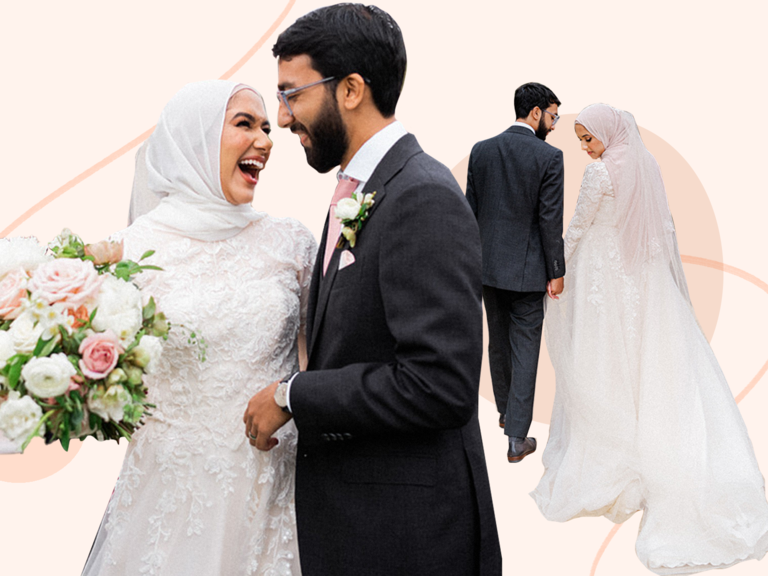
33. Moroccan Wedding Traditions
Moroccan wedding traditions overflow with beauty and depth, even before the big day arrives. You can expect a prewedding hammam as well as a henna party. On the actual day of the wedding, there's an offering of milk and dates that usually take place during the ceremony. The wedding day wraps up with a reception filled with lots of music.
34. Muslim Wedding Traditions
In Islam, weddings are viewed as a couple entering into a contract with Allah. The main requirement at traditional Muslim weddings is the signing of the marriage contract at the nikah ceremony. Other traditions, like gender separation, vary by Islamic sect and culture.
35. Native American Wedding Traditions
Couples who are members of Native American tribes or descended from Native or Indigenous American groups may consider including a custom from their specific tribe in their wedding ceremony. From the blanket ceremony to the vase ritual, Native American customs differ from tribe to tribe.
36. Nigerian Wedding Traditions
With an estimated 371 tribes in Nigeria, traditional Nigerian weddings aren't a one-size-fits-all event. However, there are some traditions that are commonly seen across the majority of Nigerian weddings. Traditional attire like aso-ebi and geli is common and the money spray at the reception.
37. Norse Wedding Traditions
Norse wedding traditions are influenced by the Nordic region's Viking heritage. Expect to clear your calendar on a Friday, as most traditional Norse weddings happen that day. What's another marriage tradition of note from this culture? The handfasting ceremony.
38. Pakistani Wedding Traditions
It's amazing, and beautiful, how varied weddings from different cultures are. Pakistani wedding traditions are striking and weddings in this culture may last up to ten days. The couple's honeymoon, the Shab-i-Zifaf, is also a special part of traditional Persian weddings. And if you're wondering which countries throw rice at weddings, Pakistan is one of them. In Pakistan, rice is an important nutrient and symbolizes wealth and prosperity that's why when the bride departs her family's home, called the rukhsati or doli ceremony, she throws rice over her head at the home's threshold to signify leaving her mother's nurturing and joining her husband's family.
39. Persian Wedding Traditions
When thinking about wedding ceremony traditions around the world that stand out, it's important to look at Persian and Iranian weddings. At traditional Persian weddings, sofreh aghd involves an elaborate spread laid on a table for ceremonial purposes. It is a table laden with many symbolic items that bring specific meaning to the nuptials.
40. Polish Wedding Traditions
One Polish wedding tradition is the practice of the couple's parents gifting them bread sprinkled with salt during the wedding ceremony to represent prosperity and bitterness. Also, an unveiling sometimes happens during the reception to symbolize the bride's entrance into womanhood.
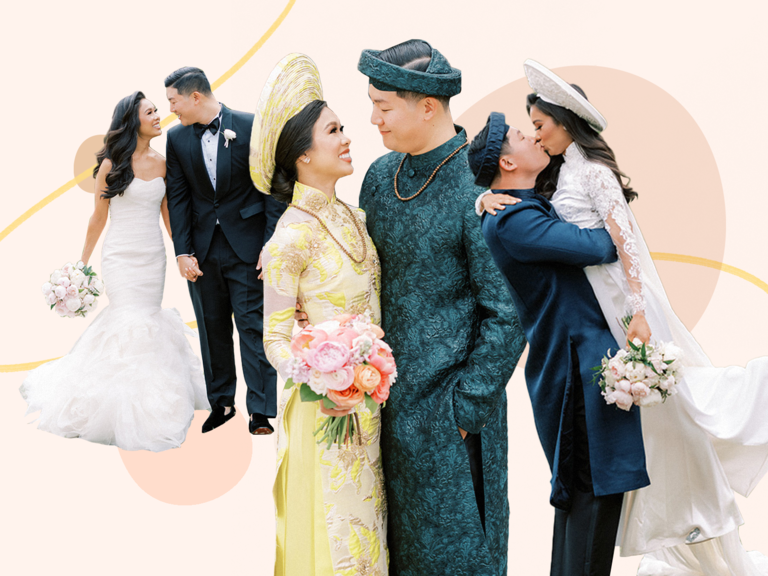
41. Protestant Wedding Traditions
Traditional Protestant weddings differ based on denomination, however, many of them will include the reading of scripture passages and communion. Some couples may also light a unity candle to mark their coming together in marriage.
42. Puerto Rican Wedding Traditions
Like other wedding traditions around the world, Puerto Rican customs are rooted in rich history. Most Puerto Rican weddings are Catholic and follow protocols set forth by the Catholic church. At the wedding reception, get ready to put on your dancing shoes and sing your heart out.
43. Romanian Wedding Traditions
Romanian weddings are similar to Eastern Orthodox affairs and unions in other Eastern European countries. At Romanian weddings, the bride's hair may be braided and covered with flowers and ribbons. And postwedding, the couple and loved ones might enjoy ciorba de potroace, a sour soup, made to help recover from the previous day's festivities.
44. Russian Wedding Traditions
Russia has a population of almost 200 different ethnic groups so there's lots of diversity in Russian wedding traditions. Also, weddings have changed significantly since the time of the Soviet Union. Notably, brides often wore red to their weddings during the reign of the USSR, but many modern Russian brides now opt for white. Another distinction of note with Russian weddings? Most couples have civil ceremonies at city hall and then have a large celebration.
45. Scottish Wedding Traditions
What sets Scottish weddings apart from other wedding traditions around the world? First, bagpipes are central to traditional Scottish weddings. Secondly, a sixpence in the shoe, as mentioned in the "something borrowed, something blue" rhyme is a mainstay at Scottish weddings.
46. Spanish Wedding Traditions
Fashion is a big part of marriage in different cultures, and Spanish weddings are no exception. Most brides wear an intricate wedding veil known as a mantilla for the big day. Wondering what the wedding party wears? You'll be surprised to find out that Spanish weddings typically don't have bridesmaids or groomsmen.
47. Swedish Wedding Traditions
Looking for the most delicious of wedding traditions and customs around the world? One of the tastiest Swedish wedding traditions is the kransekake wedding cake. As for the main meal, fish or wild game may be served.
48. Thai Wedding Traditions
White thread and water are two things that are crucial in traditional Thai weddings. During the white thread ritual, the couple will be joined by a white thread to symbolize their union. As for water, to-be-weds will receive a water blessing as water is poured over their hands at the wedding.
49. Turkish Wedding Traditions
Turkish weddings are full of lively culture. For example, the bride doesn't wear all white at the wedding, instead, she typically has on a red veil or ribbon tied around her waist to represent luck, purity and wealth. At a Turkish wedding reception, you can expect to see keşkek, a chicken, wheat and barley stew, made by the groom and his loved ones.
50. Vietnamese Wedding Traditions
Like Chinese weddings, traditional Vietnamese weddings often include a tea ceremony as a way of paying respect to elders. One unique element of a Vietnamese wedding is the processional where the groom and groomsmen come to the bride's home with gifts for the wedding feast to kick off the celebrations.
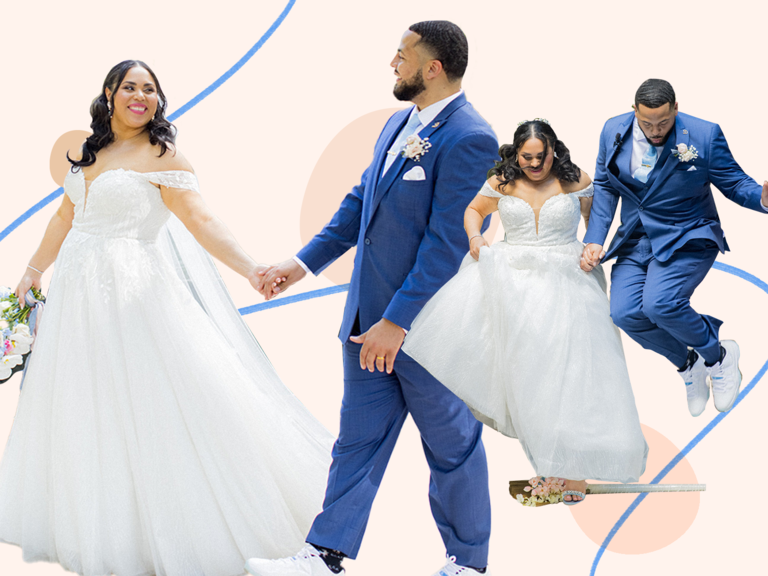
Other Wedding Traditions Around the World You Should Know
After reading about 50 wedding traditions around the world, you're probably wondering how many more wedding customs exist. Well, with 193 countries recognized by The United Nations and thousands of different, religions, languages and cultures present, all we know for sure is that the world is made up of a beautiful web of people who celebrate weddings in their own special ways. Below are some other cultural and religious wedding traditions you should put on your radar.
- Albanian Weddings Traditions
- American Wedding Traditions
- Argentinian Wedding Traditions
- Australian Wedding Traditions
- Brazilian Wedding Traditions
- British Wedding Traditions
- Canadian Wedding Traditions
- Chilean Wedding Traditions
- Fijian Wedding Traditions
- Guatemalan Wedding Traditions
- Kenyan Wedding Traditions
- Lithuanian Wedding Traditions
- Morman Wedding Traditions
- Quaker Wedding Traditions
- Taiwanese Wedding Traditions
- Ukrainian Wedding Traditions
Cultural Wedding Tradition Tips to Consider
If the traditions above motivate you to incorporate some in your wedding, there are a few tips to keep in mind. "Wedding celebrations are all about sharing with your guests why you are getting married and what you mean to each other," says Watson. "They're also a time when you can fully immerse your wedding guests into your customs and rituals." Due diligence is crucial during wedding planning to ensure you practice given traditions respectfully and responsibly. Here are tips for planning your cultural or religious union.
You Can Include Multiple Cultures in Your Wedding
Incorporating culture into your wedding day doesn't have to be all or nothing. Most weddings blend multiple cultures or mix faiths. As you plan your one-of-a-kind affair, take stock of the rituals you could honor with your wedding. Then, talk with your partner about which traditions speak to you and would be most appropriate to infuse into your wedding day.
Understanding the History of the Tradition is Important
It's important to understand the nuances of a given custom before deciding if it's the right fit for your wedding. Many wedding traditions around the world have a specific purpose, be it to usher in good luck or keep away evil spirits. By not properly researching a custom, you can potentially practice it in a way that's disrespectful to the culture or religion it originated. To ensure you're on the right page, speak with your family to fully understand how weddings are celebrated within your family.
Always Hire Experienced Pros
Hiring wedding professionals who have experience with the customs of your culture or religion is a good way to ensure everything is executed seamlessly. The top vendors you need to book to achieve this, are a wedding planner and officiant. This way you don't have to worry about numerous misunderstandings and you can feel comfortable with them helping you bring your wedding vision to life.
Additional reporting by Chapelle Johnson

